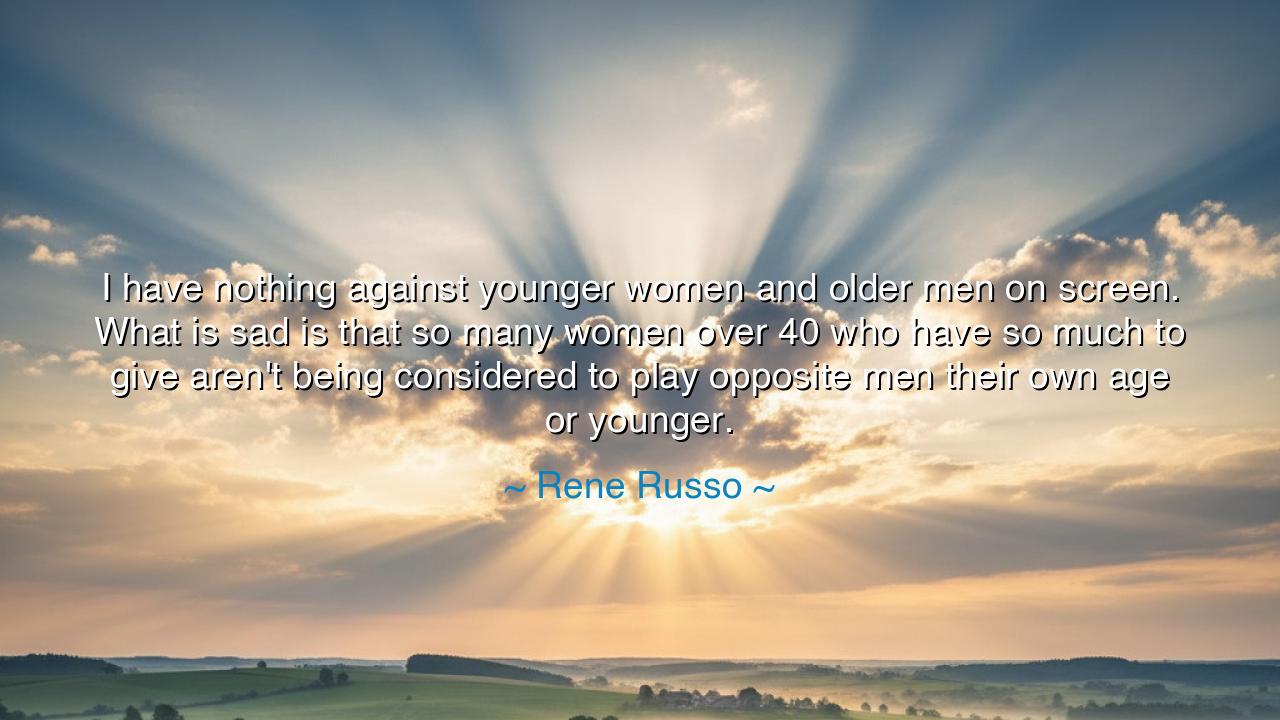
I have nothing against younger women and older men on screen.
I have nothing against younger women and older men on screen. What is sad is that so many women over 40 who have so much to give aren't being considered to play opposite men their own age or younger.






Hear, O children of truth and seekers of justice, the voice of Rene Russo, who, having walked the glittering halls of cinema, spoke with clarity and sorrow: “I have nothing against younger women and older men on screen. What is sad is that so many women over 40 who have so much to give aren't being considered to play opposite men their own age or younger.” In this declaration lies not bitterness, but the unveiling of an imbalance—an indictment of a world that treasures women’s youth above their wisdom, and a lament for the silencing of voices that have ripened with experience.
The meaning of her words strikes at the heart of age and gender in art. She does not condemn the pairing of youth and age itself, for such stories may have beauty. Rather, she laments the exclusion—the refusal to grant women beyond a certain age the chance to stand fully in their power, to be seen as desirable, dynamic, and worthy partners to men of equal or lesser years. It is not the story of May and December that wounds, but the erasure of stories where women over 40 shine as heroines in their own right, with depth forged by time.
History offers us a clear mirror. In the courts of kings and emperors, older men often took younger brides, while queens and noblewomen were dismissed when their youth had passed. Yet even within such prejudice, history remembers those who defied it. Cleopatra, though no longer a maiden, captivated rulers with her intellect and presence. Eleanor of Aquitaine wielded influence and charm well into maturity, commanding respect as both mother and sovereign. These women proved that power and allure do not wither with age—it is only the blindness of culture that refuses to see them.
Cinema itself provides a bitter example. How often have we seen actors well into their fifties and sixties cast opposite women half their age, their maturity celebrated while women’s maturity is punished? The man grows “distinguished,” while the woman is deemed “too old.” This double standard does not reflect truth but rather fear—a fear of confronting the beauty and strength of women beyond youth, a fear of stories that celebrate their depth rather than diminish it. Russo’s words are a protest against this cultural blindness, a plea for balance.
The lesson is one of justice and recognition. Every stage of life carries its own radiance. Youth is bright and swift, yes, but age brings gravity, richness, and a beauty that shines in wisdom. To deny women over 40 their rightful place in art and in society is to rob humanity of half its truth. It is to present the world as a shallow image, rather than as the full, living reality it is. To honor mature women is to honor the wholeness of human experience.
The warning is also present: a culture that refuses to see the value of its women beyond youth impoverishes itself. When stories cease to reflect the breadth of life, they become hollow entertainments rather than reflections of truth. And when society denies women visibility in their fullness, it teaches younger generations to fear aging, to despise their own future selves. Thus, the silencing of women is not their loss alone—it is the loss of all.
As for practical action, let us widen our vision. Support films, art, and stories that celebrate women of all ages, that give voice to their complexities and truths. If you are a creator, write such roles; if you are a consumer, seek them out and honor them. In daily life, respect the wisdom of women who stand beyond youth, not as relics of the past, but as bearers of stories and strength that the world needs. And if you are a woman who hears these words, do not let culture’s blindness dim your light. Live fully, boldly, and visibly, so that others may see in you the beauty they were taught to ignore.
Thus, Russo’s words endure as both lament and command: “What is sad is that so many women over 40 who have so much to give aren't being considered.” Let us not allow this sadness to remain. Instead, let us honor every age, every stage, and every woman, so that art and life alike may shine with the full truth of human beauty. For a society that sees all its women clearly is a society that sees itself clearly—and that is the first step toward wisdom.






AAdministratorAdministrator
Welcome, honored guests. Please leave a comment, we will respond soon